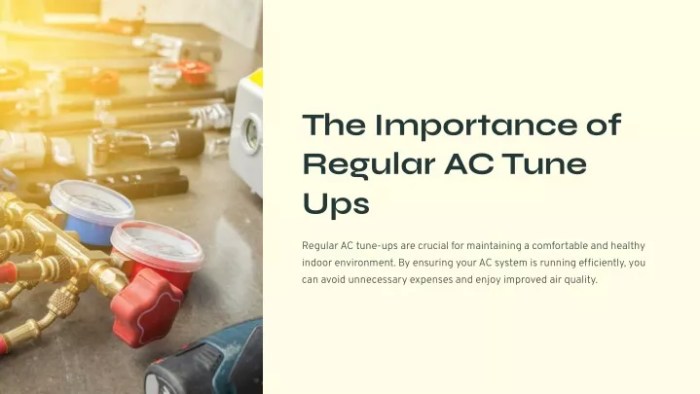Importance of regular AC tune-ups sets the stage for this enthralling narrative, offering readers a glimpse into a story that is rich in detail with research style and brimming with originality from the outset.
Regular AC tune-ups are crucial for maintaining the efficiency and longevity of your system. Neglecting these tune-ups can lead to costly repairs and decreased energy efficiency, making it essential to stay on top of maintenance tasks. In this guide, we will delve into the significance of regular AC tune-ups, the recommended frequency, key components involved, and DIY maintenance tips to keep your system running smoothly.
Importance of regular AC tune-ups

Regular AC tune-ups are crucial for maintaining optimal performance and extending the lifespan of your air conditioning system. Neglecting these tune-ups can lead to costly repairs and reduced efficiency, ultimately impacting your comfort and budget. By ensuring your AC unit is well-maintained, you can enjoy a range of benefits, including improved energy efficiency and lower utility bills.
Prevent Costly Repairs
Regular AC tune-ups help identify and address minor issues before they escalate into major problems. By scheduling routine maintenance, you can prevent costly repairs that may arise from neglect or lack of attention. Addressing issues early can save you money in the long run and ensure your AC system operates smoothly throughout its lifespan.
Improved Energy Efficiency, Importance of regular AC tune-ups
One of the key benefits of regular AC tune-ups is improved energy efficiency. A well-maintained system operates more effectively, consuming less energy to cool your home. This not only reduces your carbon footprint but also lowers your monthly energy bills. By keeping your AC unit in top condition, you can enjoy a comfortable indoor environment without breaking the bank.
Extended Lifespan
Another advantage of regular AC tune-ups is the extension of your system’s lifespan. By providing proper maintenance, you can help your AC unit last longer and delay the need for costly replacements. Investing in routine tune-ups can ultimately save you money by avoiding premature breakdowns and the expenses associated with a new air conditioning system.
Enhanced Indoor Air Quality
Maintaining your AC system through regular tune-ups also contributes to improved indoor air quality. Clean filters, coils, and ducts ensure that your home is free from contaminants and allergens, promoting a healthier living environment for you and your family. By prioritizing maintenance, you can breathe easier and enjoy a cleaner, more comfortable indoor space.
Frequency of AC tune-ups: Importance Of Regular AC Tune-ups
Regular maintenance is crucial to ensure the optimal performance of your AC system. This includes periodic tune-ups to keep the unit running efficiently and extend its lifespan.
Frequency for Older AC Units
For older AC units (over 10 years old), it is recommended to have a professional tune-up at least once a year. Older units tend to accumulate more wear and tear, making regular maintenance essential to prevent breakdowns and costly repairs.
Frequency for Newer AC Models
Newer AC models (less than 10 years old) may require tune-ups less frequently, typically every 2-3 years. However, it is still important to schedule regular maintenance to catch any issues early and ensure the system operates at its best.
Industry Recommendations
Industry experts generally advise homeowners to schedule AC tune-ups at least once a year, preferably before the start of the cooling season. This proactive approach can help identify potential problems, improve energy efficiency, and save money on utility bills in the long run.
Components of an AC tune-up

Regular AC tune-ups involve a thorough inspection and servicing of various components to ensure optimal performance and efficiency. Let’s delve into the key components that are typically checked and serviced during a routine AC tune-up.
Cleaning or Replacing Air Filters
Air filters play a crucial role in maintaining good indoor air quality and enhancing the efficiency of your AC system. During a tune-up, HVAC technicians will inspect the air filters to determine if they are clogged or dirty. Clogged air filters can restrict airflow, leading to strain on the system and reduced cooling capacity. Therefore, cleaning or replacing air filters is essential to ensure proper airflow and prevent dust and debris from circulating in your home.
Refrigerant Levels
Refrigerant is the substance responsible for cooling the air in your AC system. Low refrigerant levels can indicate a leak in the system, which can lead to inefficient cooling and potential damage to the compressor. During a tune-up, technicians will check the refrigerant levels and top them off if necessary. Maintaining proper refrigerant levels is crucial for ensuring efficient cooling and preventing costly repairs in the future.
DIY maintenance between tune-ups
Regular maintenance is key to ensuring the optimal performance and longevity of your AC system. In addition to scheduling professional tune-ups, there are several simple maintenance tasks that homeowners can perform to keep their AC system running smoothly.
Cleaning and maintaining the exterior unit
Regularly cleaning and maintaining the exterior unit of your AC system is essential for its efficiency. Here are some best practices to follow:
- Clear any debris such as leaves, twigs, and dirt from around the unit to ensure proper airflow.
- Clean the fins of the unit with a soft brush to remove any buildup of dust and debris.
- Inspect the fins for any damage and straighten them if necessary to prevent airflow restriction.
- Check the condenser coils for dirt and clean them using a coil cleaner to improve efficiency.
- Trim any vegetation or bushes around the unit to maintain proper airflow and clearance.
Importance of regular visual inspections
Performing regular visual inspections of your AC system can help you catch potential issues early before they escalate into costly repairs. Here are some key points to consider during visual inspections:
- Check for any leaks or moisture around the unit, which could indicate a refrigerant leak.
- Listen for any unusual sounds coming from the unit, such as grinding or squealing noises.
- Inspect the air filters and replace them if they are dirty to maintain proper airflow.
- Monitor the thermostat settings and ensure they are correctly configured for optimal cooling.
- Look for any signs of wear and tear on the components of the AC system and address them promptly.
Last Recap
In conclusion, regular AC tune-ups are a proactive approach to ensuring your system operates efficiently and avoids major breakdowns. By staying on top of maintenance tasks and scheduling tune-ups as recommended, you can enjoy a comfortable indoor environment while saving money on repair costs in the long run.
Reducing AC energy consumption is crucial for both cost savings and environmental sustainability. One effective way to achieve this is by implementing energy-efficient practices, such as regular maintenance and cleaning of the AC unit. By following the tips outlined in this guide on reducing AC energy consumption , individuals can significantly lower their energy bills while reducing their carbon footprint.
When facing AC compressor issues, troubleshooting the problems promptly is essential to avoid further damage and costly repairs. Understanding the common signs of compressor issues and knowing how to address them can help prolong the lifespan of the AC unit.
Check out this comprehensive guide on troubleshooting AC compressor issues for practical tips and solutions.
Calibrating the thermostat is a simple yet effective way to enhance AC efficiency and ensure optimal performance. By adjusting the settings based on personal preferences and the seasonal changes, individuals can maximize comfort while minimizing energy waste. Learn how to properly calibrate the thermostat by following the steps outlined in this guide on calibrating thermostat for AC efficiency.